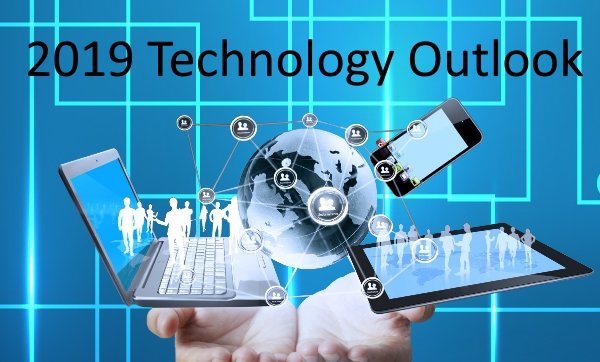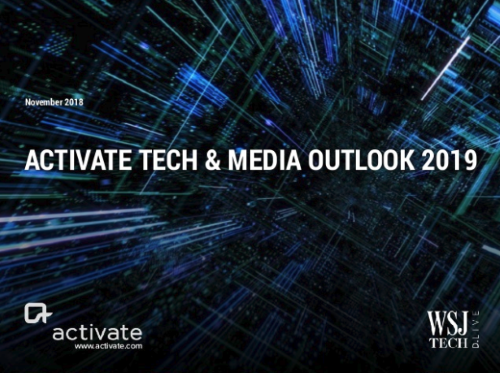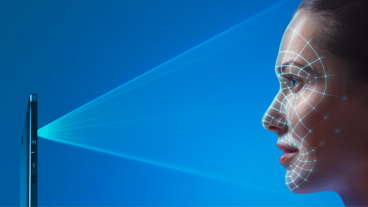
Digital technology continues to connect and enrich the lives of people all over the globe and is transforming the tools of everyday life, but there are risks accompanying the tremendous benefits. Entire markets are committed and reliant on digital tools. The entertainment, communications, socialization, and many others sectors are heavily intertwined with digital services and devices that society is readily consuming and embracing. More importantly, the normal downstream model for information has transformed into a bi-directional channel as individuals now represent a vast source of data, both in content as well as telemetry. These and many other factors align to accelerate our adoption and mold our expectations of how technology can make a better world.

This year’s Activate Tech & Media’s Outlook 2019 presentation provides a tremendous depth of insights in their slide deck (153 slides) with a great amount of supporting data. It highlights many of the growth sectors and emerging use-cases that will have profound impacts on our daily lives.
Transforming Tech Intelligence

We are moving from the first epoch of digitally connecting people, to the second epoch of making intelligent decisions through technology. Artificial Intelligence research is advancing and with it the infrastructure necessary to make it scalable across a multitude of applications. Solutions are just beginning to emerge and yet showing great promise to make sense and use the massive amounts of data being generated.
Overall, devices and services continue to evolve with more awareness and functionality. We are in the ramp of adding ‘smart’ to everything. Smart: cars, cities, homes, currency, cameras, social media, advertising, online-commerce, manufacturing, logistics, education, entertainment, government, weapons, etc. It will be the buzzword for 2019-2020.
Such transformation opens the door where tools can begin to anticipate and interweave with how people want to be helped. Better interaction, more services, and tailored use-cases will all fuel a richer experience and foster a deeper embrace into our lives. Technology will be indispensable.
Risks and Opportunities

Reliance in our everyday activities means we have the luxury of forgetting how to accomplish menial tasks. Who needs to remember phone numbers, read a map, operate a car, or know how to use a complex remote control. Soon, our technology will listen, guide, watch, autonomously operate, and anticipate our needs. Life will seem easier, but there will be exceptions.
All these smart use-cases will require massive data collection, aggregation, and processing which will drive a new computing infrastructure market. Such reliance, intimate knowledge, and automation will also create new risks.
The more we value and rely on something, the more indebted we are when it fails. We must never forget that technology is just a tool. It can be used for good or for malice. There will be threats, drawn to such value and opportunity, that will exploit our dependence and misuse these tools for their gain and to our detriment. At the point people are helpless without their intelligent devices, they become easy victims for attackers. As we have seen with data breaches over the past several years, when people are victimized, their outlook changes.
In this journey of innovation and usage, public sentiment is also changing across many different domains. The desire for Security, Privacy, and Safety (the hallmarks of Cybersecurity) continues to increase but may initially be in direct conflict for our desire to rapidly embrace new innovations. This creates tension. We all want new tech toys (it is okay to admit it)! Innovation can drive prosperity and more enjoyment in our lives. But there are trade offs. Having a device listen, record and analyze every word you say in your bedroom may be convenient in turning on the lights when you ask, but it may also inadvertently share all the personal activities going-on without your knowledge. A smart car effortlessly transporting you to work while you nap or surf the internet sounds downright dreamy but what if that same car is overtaken by a malicious attacker who wants to play out their Dukes of Hazzard fantasies. Not so much fun to think about.
In the end, we all want to embrace the wonderful benefits of new technology, but will demand the right levels of security, privacy, and safety.
Trust in Technology

Unfortunately, trust in digital technology is only now becoming truly important. In the past, if our primary computing device (PC or phone) crashed, we breathed a small curse, rebooted and went on our way. We might have a dropped call or lost part of a work document, but not much more harm than that. That is all changing.
In the future, we will heavily rely on technology for transportation, healthcare, and critical infrastructure services. That autonomous car we expect not to crash, the implanted pacemaker or defibrillator we expect to keep us alive, or the clean water and electricity we expect to flow unhindered to our homes may be at risk of failure, causing unacceptable impacts. We want tech, but very soon people will realize they also need security, privacy, and safety to go along with it.
But how will that work? We don’t typically think of trust in terms of high granularity. We naturally generalize for such abstract thoughts. We don’t contemplate how trustworthy a tire, bumper, or airbag is, as those are too piecemeal, rather we trust the manufacturer of the car to do what is right for all the components that make up the vehicle we purchase. We want the final product, tied to a brand, to be trustworthy. For those companies that we trust, we tend to believe, whether correct or not, in all their products and services. This reinforces tremendous loyalty. The reverse is true as well. One misstep can become a reputational blight affecting sentiment across all a company’s offerings.
The saying “We earn trust in drips and lose it in buckets” perfectly exemplifies the necessary level of commitment.

Trust may become the new differentiator for companies that can deliver secure and safe products in a timely fashion. Those who are not trustworthy may quickly fall out of favor with consumers. Privacy is the first in many problems. Consumers, government regulators, and businesses are struggling to find a balance that must be struck between gathering data necessary for better experiences, but not too much that it becomes a detriment to the user. A difficult conundrum to overcome. Security and safety aspects will follow, where the potential risks grow even higher. The challenges are great, but so will the rewards for all those who succeed. I believe those companies which master these disciplines will earn long-term loyalty from their customers and enjoy a premium for their products.
2019 might be the first year where we witness this delineation as consumers may gravitate to more responsible companies and begin to shun those who have misplaced their trust. The big story for next year may in fact be how purchasing decisions for technology are changing, thus driving greater commitment to making products and services more security, private, and safe.
Great info. Keep it coming!!!
many people, including myself, are hesitant to allow more technology to aspects of their life that didnt need to be there in the first place. the uncertainty roots from something monitoring r doing activities not disclosed.